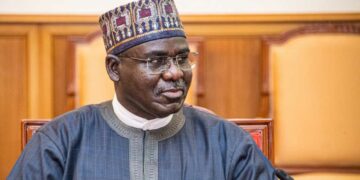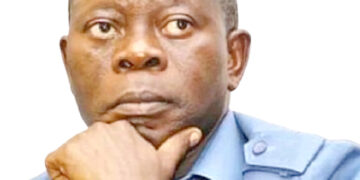The BBC’s outgoing Director-General, Tim Davie, has urged staff to “fight” for the broadcaster’s journalism amid a storm over a disputed documentary edit that has drawn a $1 billion lawsuit threat from United States President Donald Trump.
“I see the free press under pressure, I see the weaponisation. I think we’ve got to fight for our journalism,” Davie told staff on Tuesday, in what appeared to be a farewell rallying cry as he and BBC News CEO Deborah Turness stepped down following the controversy.
The row erupted after Trump’s lawyers accused the BBC of defamation, claiming a Panorama documentary aired last October wrongly implied that the U.S. president had directly urged “violent action” ahead of the January 6, 2021 Capitol assault.
In a formal notice to the BBC, Trump’s legal team gave the broadcaster until Friday to “appropriately compensate” him for “harm caused” by the edit or face a $1 billion lawsuit in Florida.
The BBC has since apologised, acknowledging that the programme “gave the impression” Trump had incited violence, an assertion it now concedes was inaccurate. “We made some mistakes that have cost us,” Davie admitted during his address, adding that “times are difficult.”
The controversy deepened existing tensions within the BBC and its board. It followed the leak of an internal memo by former BBC adviser Michael Prescott, who raised concerns about editorial bias in coverage of Gaza, the BBC Arabic service, and trans issues.
In a public apology on Monday, BBC chair Samir Shah said the corporation had “taken steps to address” the issues raised in Prescott’s report and pledged to “reform oversight within the organisation.”
However, some current and former BBC journalists say right-wing board members have exploited the situation, accusing them of pushing claims that the broadcaster is “institutionally biased,” an allegation Turness flatly denied before her resignation.
Former BBC editor and presenter Mark Urban, meanwhile, suggested liberal voices within the newsroom also shared blame. Writing in a blog, he argued that the BBC’s lapses were “symptoms of culture wars on both sides.”
The timing of the crisis was particularly sensitive as the BBC prepared to renegotiate its Royal Charter, the document that defined its governance and funding model, due to expire in 2027.
Despite the uproar, Davie insisted the broadcaster remained well positioned: “We’re in a really good position to get a good charter,” he said.
United Kingdom’s Culture Minister, Lisa Nandy told Parliament on Tuesday that the review process would begin before the end of the year. While urging the BBC to “uphold the highest standards,” she cautioned against “a sustained attack” on what she called the country’s “most widely used and trusted source of news.”
Prime Minister Keir Starmer’s Labour government now faces a delicate balancing act, supporting the BBC’s independence without appearing to side against the U.S. president, one of Britain’s most powerful allies.
Legal experts said Trump may face an uphill battle. Matthew Gill, a media and defamation lawyer, told AFP that the lawsuit’s prospects in the U.S. are weak. “The Panorama documentary would probably have had a very small audience in the U.S., making it harder to prove harm caused to Trump,” he said.
Moreover, Trump cannot sue in the UK, where libel claims are subject to a one-year limitation period.
Still, the episode underscored both the fragility and importance of public broadcasting in an era of heightened political polarisation.
As Davie prepared to leave, his message to staff remained defiant: “I see the free press under pressure… We’ve got to fight for our journalism.”





